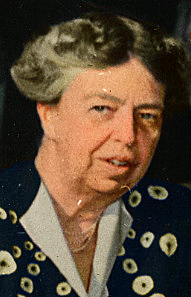
MY DAY
By Eleanor Roosevelt
January 1, 1946
EN ROUTE TO LONDON, Monday – On New Years Day our thoughts turn back to the beginning of the year just past.
On New Years Eve, 1944, my husband was not feeling very well. In order to do the work which was really important, we all were trying to ask of him as few unessential efforts as possible.
So we did not ask him to come down to dinner that night or to spend the evening with us. But he insisted that the custom which we always observed while we were in the White House should be carried on that evening, and about 11:30 he got up and came into his study to join with the few members of the family and the friends who had gathered there. He greeted us all as cheerily as usual.
None of us knew he was planning to start before long for the important Yalta conference. Many of us knew the difficulties which beset him as they do all men in public life. Associates who should be selfless and who instead are self-seeking: coworkers who often are not only personally disloyal to the chief with whom they serve, but who frequently are disloyal to the ideas which they and the chief serve together. The difficulty of getting able men to give up their own and their friends interests. In order to serve in a public capacity: the misunderstanding of motives; the criticism of administration.
All of these are familiar troubles, but why go on? They are the recital of the difficulties which beset any man who rises high in public office in this country. This is the price any public servant pays for serving the people.
In spite of the price, however, the chance to do something which may change the course of history and may mean that future generations will not have to suffer some of the ills which beset the present generation, is worth it, as many men have found. It certainly never seemed too great to the man who, as the clock struck midnight and 1945 came in, raised his glass and said, “We drink to the United States of America.”
No one in the room could hear his tone and watch his gesture and not feel something constrict in their throats. Then came the second toast, “A Happy New Year and health and happiness to those we love, both absent and present.” The individual greetings went on as each of us spoke to every other person in the room and finally my husband left us and went back to bed.
The year 1945 has been a hard year with loss and bitterness to many people, but to the United States peace has come again. Our men in the armed services still are scattered in many parts of the world, but now they are building better relationships with the nations where they are stationed. They are our first ambassadors. Others will follow in the next few years, bringing relief first and then new commerce.
Let us hope we all have the same sense of responsibility and good-will to implement the United Nations Organization which in this coming year will be permanently set up to try to bring pence to the world.
A year of important happenings, both sad and glad, lies behind us, but the year ahead is an unwritten page and much that will be written on it depends on the way our hearts feel, our minds understand and our hands work for the good of the world as a whole.